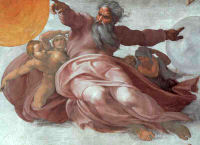WATCH AND PRAY
(A biblical reflection on THE FIRST SUNDAY OF ADVENT [Year B], 30 November 2014)
Gospel Reading: Mark 13:33-37
First Reading: Isaiah 63:16-17,19;64:1,3-8; Psalms: Psalm 80:2-3,15-16,18-19; Second Reading: 1 Corinthians 1:3-9
The Scripture Text
“Take heed, watch and pray; for you do not know when the time will come. It is like a man going on a journey, when he leaves home and puts his servants in charge, each with his work, and commands the doorkeeper to be on the watch. Watch therefore – for you do not know when the master of the house will come, in the evening, or at midnight, or at cockcrow, or in the morning – lest he come suddenly and find you asleep. And what I say to you I say to all: Watch.” (Mark 13:33-37 RSV)
Once upon a time, God, the infinite, eternal and all powerful One, came down to meet us on the dusty roads of human life. In the flesh of Jesus Christ, God walked with us through our light and darkness, our joys and sorrows, our solitude and relationships. Scripture writers called it the “fullness of time”. Things would never be the same again.
In Jesus Christ, God spoke to us in the human language that we can understand. His life warmly portrays God’s love and concern for us. And yet the story is not complete. The journey stretches on until we fully share in Christ’s glorification. That will be at the completion of life’s journey. For the moment we are a people on the way.
Advent is a time of waiting and watching. It is a very special time for Christians. It opens the Church’s year by picking up the theme of our journey towards Christ who is coming back to meet us. We are not like wandering nomads who have no sure purpose or definite direction. We have the pilgrim’s destiny with God. We travel forward on a road of unknown length until Christ will come again.
The focus of the first Sunday of Advent is on the Second Coming of Christ. The parable of the doorkeeper speaks of the master who will come back to the servants. The message for the servants is twofold: “Be on your guard and stay awake” …… watch and pray.
One task of the doorkeeper’s employment is to keep out unwanted visitors and intruders. Here the parable is a moral warning not to open up our doors to the ways of sin. Each passing day we are to watch with the vigilant eye of the sentry to prevent any intrusions of the enemy.
The unexamined life is a city with no sentries on its walls. Anybody who is serious about living a spiritual life is advised to undertake a daily reflection on our situation. This means more than counting up the number of our faults. It involves an honesty about what motivates us in the things we do.
We are sometimes surprised when we recognize that some exemplary deeds are done out of very subtle, selfish motivation. We may be doing the right things only to be praised or at least recognized as virtuous, to impress others, or as part of a self-seeking bargain with God. In daily reflection we guard against the intrusions of selfishness in our motivation.
The second task to the doorkeeper is to open up promptly to all who have the right to enter. Applied to the spiritual life, this means a spirit of prayerfulness or sensitivity to God. The sensitive soul is awake with all the longing of the lover for the approaching footsteps of the beloved. But what is He line, this God-who-comes? In today’s first reading Isaiah uses three very appealing names for God … our Father, our Redeemer and the potter.
God is the Father who has created us with the potential to share in the divine life. God is the Redeemer who continues to pay the price of liberating us from slavery to incomplete forms of life. He offers us life to the full. And God is the potter who is ever crafting our lives anew. The present clay may be messy and, in our view, without meaningful form or beauty. But the divine craftsman can mould and fashion an amazing masterpiece in the twinkling of an eye.
The God who is coming back the road to meet us wants to lift us up as His children, wants to liberate us and fashion us anew.
Do not think of the Second Coming as so distant and unknown as to be irrelevant to the hurly-burly of today’s living. If we are spiritually vigilant and alert then the future will draw us forward towards God. Our hope will energize us by supporting us when we are weak and encouraging us to persevere.
Prayer: Lord Jesus, we believe that our lives are on a journey towards our heavenly Father who is reaching back to us this day and every day. So, we will be on our guard lest the ways of sin enslave our thoughts. We will also watch in prayer, be vigilant and alert to the daily visitations of the Holy Spirit to our souls. Praised be the name of the Holy Trinity, Father, Son, and the Holy Spirit. Amen.








 As Blessed John Henry Newman reminded us in a homily for the Advent Season: “Advent is a time of waiting, it is a time of joy because the coming of Christ is not only a gift of grace and salvation but it is also a time of commitment because it motivates us to live the present as a time of responsibility and vigilance. This ‘vigilance’ means the necessity, the urgency of an industrious, living ‘wait’. To make all this happen, then we need to wake up, as we are warned by the apostle to the Gentiles, in today's reading to the Romans: ‘Besides this you know what hour it is, how it is full time now for you to wake from sleep. For salvation is nearer to us now than when we first believed” (Rm 13:11).
As Blessed John Henry Newman reminded us in a homily for the Advent Season: “Advent is a time of waiting, it is a time of joy because the coming of Christ is not only a gift of grace and salvation but it is also a time of commitment because it motivates us to live the present as a time of responsibility and vigilance. This ‘vigilance’ means the necessity, the urgency of an industrious, living ‘wait’. To make all this happen, then we need to wake up, as we are warned by the apostle to the Gentiles, in today's reading to the Romans: ‘Besides this you know what hour it is, how it is full time now for you to wake from sleep. For salvation is nearer to us now than when we first believed” (Rm 13:11).